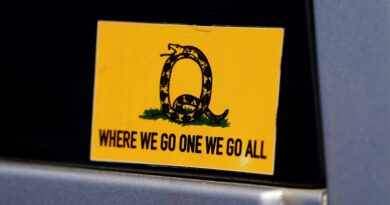Pinterest Is Still Hosting QAnon Content Despite New Ban
A search for a widely used QAnon phrase was autocompleted by Pinterest’s search bar
Pinterest is the latest platform to enact a moderation policy specifically geared at QAnon, the far-right cult that began as an online conspiracy theory. On Wednesday, a spokesperson for Pinterest told Insider that it will “proactively look for and remove content related to QAnon, in addition to taking action on content reported to us.”
As OneZero previously reported, Pinterest’s strategy for limiting the reach of problematic material stops at its search engine filter, which acts as a semi-porous wall for hiding such content, without always removing it. Insider reported that Pinterest has blocked search results for “QAnon” and “WWG1WGA,” referring to the cult’s slogan, “Where We Go One, We Go All.”
But OneZero searched for QAnon and QAnon-related terms while logged into Pinterest and found numerous keywords and content that had not been blocked or removed. A search for “WWG1WGA,” was autocompleted to “WWG1WWGA” by Pinterest’s search bar and returned results, an apparent workaround. Results for this term included pins tagged with #QAnon, #MAGA, and #14words, a prominent white supremacist slogan. Other terms that were autocompleted by Pinterest and produced search results were “We are the storm,” the “Great awakening,” “Q drops,” “Lock her up,” “Save the children,” “Take the oath,” and various phrases related to the “deep state.”
Only the term “QAnon” elicited a warning message on the platform, which states that “Pins about this topic often violate our community guidelines, so we’re currently unable to show search results.”
After OneZero notified Pinterest that “WWG1WWGA” was being recommended by the platform, the company removed the term from its search results, which now shows the same warning message about violating content.
“We disable search results for QAnon and WWG1WGA in addition to over a hundred related keywords, variations and misspellings,” a Pinterest spokesperson told OneZero. “Fighting misinformation is complex and always evolving, so we are constantly adding to and updating this list to keep our platform safe and inspiring.”
But a search for “QAnon” pins on Google, which would otherwise be hidden on Pinterest’s platform, revealed the scope of content that still exists on the website. Searching specifically for “QAnon” content hosted by Pinterest, OneZero identified Qanon artwork, phrases, and conspiracy theories. While Pinterest users would not typically browse the platform this way, Google searches are an effective method of viewing material that lingers behind Pinterest’s search bans.
“Pinterest is not a place for QAnon conspiracy theories so in August 2018, we started banning this content,” Pinterest’s spokesperson added. “We proactively look for and remove content related to QAnon, in addition to taking action on content reported to us. We also disable search results for QAnon and other conspiracy theories.”
A Daily Beast report last year revealed that Pinterest had allowed QAnon to propagate and reach new female audiences. In the past, Pinterest users have targeted middle-aged moms by pinning Qanon conspiracy theories next to more benign content, such as recipes and fashion tips. Unlike other platforms, Pinterest’s recommendation algorithm can also expose users to problematic content based on unassuming keyword searches. In 2018, Mike Caulfield, a digital literacy expert at Washington State University Vancouver, documented how a search for cooking “the perfect egg” led to pins about fringe conspiracy theories within 14 minutes of browsing.
Pinterest has been lauded for aggressively moderating its own platform using search result bans and a sophisticated recommendation algorithm. Search results for vaccinations or cancer, for example, now direct users to authenticated medical resources, rather than harmful misinformation.
Yet the company hasn’t fully scrubbed its platform of racist content, hyperpartisan memes, hate speech, medical hoaxes, and sexualized images of young girls, OneZero reported earlier this year. After OneZero surfaced this material, Pinterest acknowledged that its bans occur at the search query level, and do not result in the removal of the underlying content. The company said it also relies on users to report problematic content.
Former Pinterest moderators also told OneZero that the company’s approach to harmful material placed them at the front lines of traumatic content — some viewing endless queues of child pornography, graphic violence, and hate speech, for example. These individuals said Pinterest’s moderation strategy and tools were often flawed, and hard to implement with any sort of consistency.
Pinterest’s comment to Insider about blocks on QAnon content came weeks after Facebook took action against the group. In early October, Facebook announced a ban on pages, groups, and Instagram accounts “representing QAnon.” The company added that in August, it had already removed more than 1,500 QAnon pages and groups that contained “discussions of potential violence.” Twitter also began removing and blocking QAnon content this year.
Update: The piece has been updated to clarify that Pinterest autofilled search queries to “WWG1WWGA” and not “WWG1WGA.” The piece has also been updated to reflect a change on the platform made after publication, and to include a comment from Pinterest. Additionally, the piece has been updated to clarify when Pinterest took action against QAnon.
*** This article has been archived for your research. The original version from Google News can be found here ***


